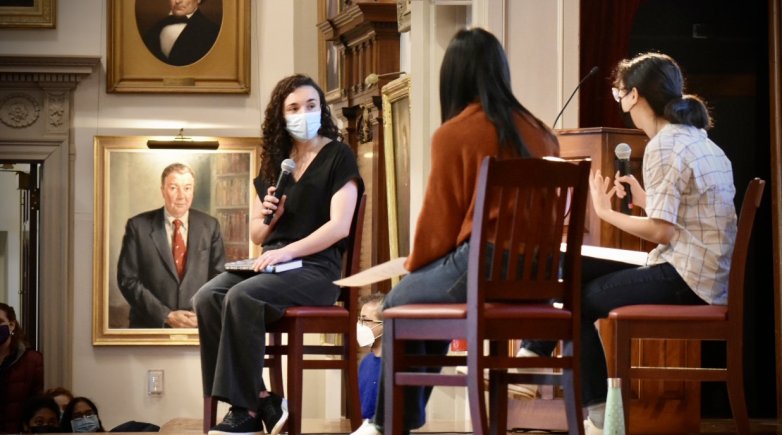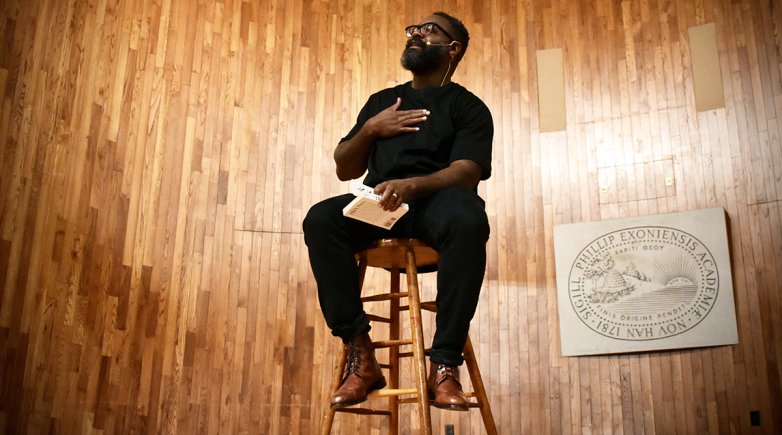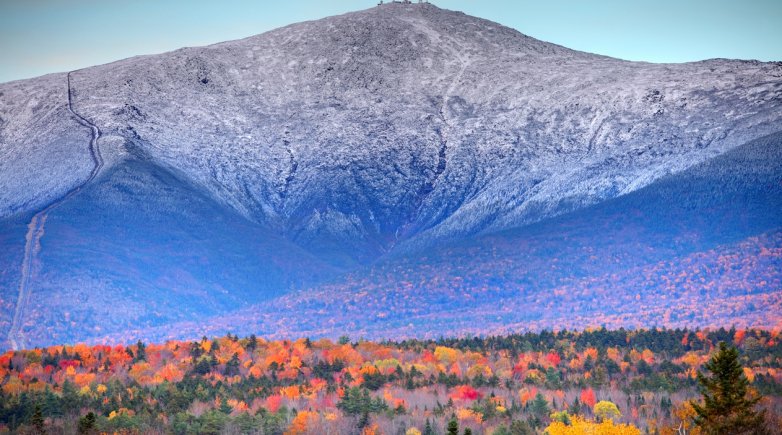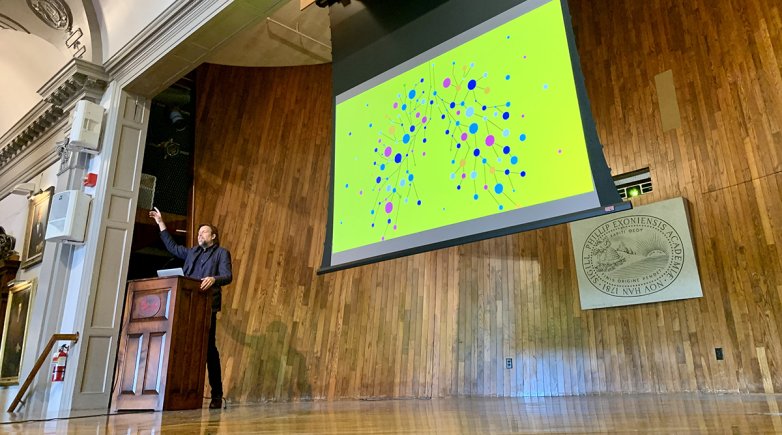Devi Lockwood ’10 discovered her love for listening to people and hearing their stories amid one of the darkest episodes of her life.
A junior at Harvard in April 2013, Lockwood was in Boston when two brothers detonated homemade bombs near the finish line of the Boston Marathon. Three people were killed in the blasts; 264 more were injured, including 17 who lost limbs.
A manhunt ensued, with the entire city on lockdown until the perpetrators were caught.
“When that lifted, all I wanted to do was talk to strangers and to remind myself that not everyone is murderous,” Lockwood told an assembly audience last week during a visit to Exeter. “I cut open a cardboard box and wrote ‘open call for stories’ in Sharpie on it, and wore that as a sign around my neck while I walked around the city. And some people stared at me, they thought it was pretty weird, but some people approached me to share a story. And once I started having these conversations and listening to strangers, I really didn't want to stop.”
That summer, Lockwood rode her bicycle 800 miles down the Mississippi River, wearing the sign as she went. “The farther down the river I rode my bike, the more stories I was hearing, specifically about water and climate change, in terms of intensifying storms, salt water encroachment on the land, and people making the decision to leave places that they had called home for generations in the aftermath of a big storm.”
What began as self-therapy turned into an odyssey that continues today. Lockwood has traveled across 20 countries on six continents — mainly by bicycle — to document stories about the effects of climate change. Her research has resulted in her first book, 1,001 Voices on Climate Change, published by Simon & Schuster in August 2021.
“I was wondering, what might it mean to put those voices in dialogue with the stories of people from other parts of the world?” she recalled. “My goal became to listen to those stories about water and climate change, and amplify the voices of people I met, who were the most impacted.”
After a brief assembly presentation, Lockwood sat for an interview on stage with seniors Lina Huang and Emma Chen. Below are highlights of that conversation:
You've collected 1,001 stories, which is a tremendous amount, and we're wondering if you see any recurring themes throughout that? And how do you highlight some of these unifying elements while preserving the unique context of each story?
I would say one thing that surprised me in how common it was across geographies was the theme that climate change can drive migration. I remember meeting this one modern dancer in Bangkok, and he told me that his family had grown rice for generations in the rural North. And because of changing rainfall patterns, growing rice as a livelihood was just becoming unpredictable and something that he couldn't imagine for himself and his future. He, like many people of his generation, and he wasn't that much older than I was, had made the decision to move to a city in search of work. … Climate change is driving migration and it's exacerbating related issues. It's not just about what's happening in the air or in the rain, but how people are impacted by that has this domino effect elsewhere.
Your theme of slowing down was really powerful for me to read, especially with the notion of, you have to keep on moving, you have to keep on doing things; and just the ability to let yourself have space and time was really powerful. Along those lines, you mentioned it contributed to your practice of deep listening and how you get your interviewees to open up to you. How did you develop your techniques, and how did they change over time?
I was really bad at this at first, I have to be honest. I listened back to some of those audio recordings I made while I was traveling down the Mississippi River, and I was like, “oh God, I'm stepping over people, I'm asking questions when they're not even done answering what I had just asked before.” And it made me realize that good listening is often listening without the intention to respond. It's being present. It's being comfortable with silence sometimes, frankly, which I think was something that had scared me beforehand. I felt the need to just jump right in and ask a question, but sometimes silence is just people thinking of the next thing to say. That's not a bad thing.
And I think just fully communicating, non-verbally, that I am there to experience the gift of someone sharing their story with me, and receiving it as such. And so yeah, all of those things combine together. And it's a practice that is not always easy, especially if it's someone's point of view that I disagree with, but try to approach those types of conversations also from a place of curiosity, frankly. Why do you think the way that you think? How did you get to this point, and what can I learn from that? And I really do believe that everyone has something to teach me, if only I slow down enough to listen. It's not always easy to do that, but it can be a really fun thing to do at its best.”
When you write these stories, how do you see yourself? What do you see as your role, as a documenter or a story re-teller? And how much do you edit in the process?
It was fun to sit down and rehash all of this, in part, because when I was writing, it was mostly during the pandemic year. And so I wasn't able to travel physically, but I was traveling in my mind in the evenings when I was writing this after work. It was a really big challenge for me to figure out how much of myself to put in this book, because I didn't want readers to feel like I was using the storytellers, or that the book was all about me, because it's really not. But I also realized that I had to be the narrative sinew connecting these stories together, because it doesn't make sense if it's not grounded in the journey that led there in the first place.
I think a lot of the editing process was figuring out which stories to include, which felt the most interesting to me, which would bring in new themes, and also talk not only about the lived experiences of people who are living with climate change right now, but I interviewed a handful of climate scientists, too. Getting those two types of stories in dialogue with each other, that was the juxtaposition that I was trying to get at. And yeah, just getting it to cohere as a whole was a really fun adventure of a process.”
When you mentioned listening, that brought to mind [that] you're an Exeter graduate. And I feel like part of Harkness is also learning to listen and let other people speak. So, I'm wondering, how did your time at Exeter inform your work?
Oh, my God, so many different ways. I think I was a pretty shy and quiet kid when I came here. I was a new upper, I lived in Gould House, I was grateful to have a tiny community in the bigger one; but also felt really overwhelmed my whole first semester, because every day, all day, from when I woke up and went to breakfast till when I went to sleep was having conversations with people, and I wasn't used to talking that much and it was really tiring. But then I got used to it, and I think I realized I can have a conversation with anyone, and that's a great technique for doing this kind of project. Yeah, Harkness is as much about listening as it is about talking, so I think that that was a practice that I started to learn how to do here.
I just had a handful of really incredible teachers while I was here who were able to bring out different aspects of thinking deeply about language. I remember being in Ms. Moore's English class, and we would underline verbs and have these long, drawn-out conversations about what a verb is and what it does and how good writing is driven by verbs and verbs are the engine of the sentence, and I think about that all the time. Or even being in Ms. Foley's class, we did a gender studies class together, and I did a final project where I was doing interviews and then writing poems based on those interviews. And that was a version of what I ended up doing for my senior thesis at Harvard that then inspired this book. So yeah, it all comes back to here.
How did you change throughout this experience? And also, do you have any advice for students here, how we can be more open to exploring?
It’s important to learn how to manage your time really well, and then sometimes it's important to throw that lesson out the window, too. I think that there's a certain weirdness that not a lot of people talk about that, OK, you go through high school and then you go through college, and then what? Suddenly this map that I've followed so carefully from birth to college graduation, it's like, "Oh, oh God, I need to make some decisions for myself right now." And that's a really scary time, because also the community dissolves overnight, people are going in different directions. And for me, this project was how I channeled my creativity through that time and got through that time. And it was a weird path into young adulthood, I guess.
But I think if I were to give advice, I would encourage you guys to use the scariness of that time to listen to yourself more than anyone else, and be like, "OK, what is it that I love? What is it that energizes me? What am I really good at?" And then, "How can I use that in service of a cause that I care deeply about?" For me it took this form, but for you guys it might look like something completely different, and that's equally valid. I think really taking that time to be with yourself and to get to know yourself at that point can be really important.
What do you think the climate change movement should do moving forward, especially because you talked about highlighting stories and going beyond the statistics to show the human side of things?
I think there was one really instructive interview I did in New Zealand with this couple who were what we might call climate deniers. And I was curious to ask them, "OK, what led you to this point? How'd you get there?" And they told me about seeing the same coverage about climate change over and over again on the news on TV, where they would see an image of an iceberg calving into the water and glacier, and they felt skeptical of that because the imagery was always the same. So, I think the more that we can find different ways to discuss these issues and to just, frankly, diversify the metaphors that we use, not only the human stories and the voices but it doesn't have to be polar bears. It doesn't have to be always defaulting to the white coastal male elite, who we might turn to, to be the so-called expert on these issues.
For me, expertise also comes from lived experience, and that's equally as valid as having a PhD in atmospheric sciences. And it's important that we understand those dynamics and understand the science, and really great metaphor and good asking questions of those scientists can help us get there, to a point where it's maintaining the nuance of the science but also easy to understand. But not only that, but we need to just broaden how we discuss these issues, and I think that the movement as a whole can do a better job of that.
You are a science journalist, and in journalism, there's been a reexamining of the concept of objectivity. And I'm curious about how you deal with the lens you bring to your work, and you as a person going out there collecting stories.
I think it's important for writers to know themselves really well and know where their biases are and know where their blind spots are and be open to being called out on that, so I think that that's an openness that I've tried to bring. But it's an important question, I think the backbone of good journalism is facts, and facts are not questionable. So, I think that some of that discourse has been leaning into this really problematic territory where people feel like they can dispute facts or do their own research on an issue. And so that's where I'd really shy away from it, and be like, "No, we have these things in common, and then what we do with them is what the job of the journalist is."



